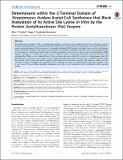| dc.contributor.author | Tucker, Alex C. | |
| dc.contributor.author | Escalante-Semerena, Jorge C. | |
| dc.date.accessioned | 2014-09-12T15:07:37Z | |
| dc.date.available | 2014-09-12T15:07:37Z | |
| dc.date.issued | 2014-06 | |
| dc.date.submitted | 2014-04 | |
| dc.identifier.issn | 1932-6203 | |
| dc.identifier.uri | http://hdl.handle.net/1721.1/89457 | |
| dc.description.abstract | Reversible lysine acetylation (RLA) is a widespread regulatory mechanism that modulates the function of proteins involved in diverse cellular processes. A strong case has been made for RLA control exerted by homologues of the Salmonella enterica protein acetyltransferase (SePat) enzyme on the broadly distributed AMP-forming CoA ligase (a.k.a. acyl-CoA synthetases) family of metabolic enzymes, with acetyl-CoA synthetase (Acs) being the paradigm in the field. Here we investigate why the Acs homologue in Streptomyces lividans (SlAcs) is poorly acetylated in vitro by the S. lividans protein acetyltransferase (SlPat) enzyme. Chimeras of S. enterica Acs (SeAcs) and S. lividans Acs (SlAcs) constructed during the course of this work were acetylated by SlPatA in vitro, retained most of their activity, and were under RLA control in a heterologous host. We identified SeAcs residues N- and C-terminal to the target lysine that when introduced into SlAcs, rendered the latter under RLA control. These results lend further support to the idea that Pat enzymes interact with extensive surfaces of their substrates. Finally, we suggest that acetylation of SlAcs depends on factors or conditions other than those present in our in vitro system. We also discuss possible explanations why SlAcs is not controlled by RLA as defined in other bacterial species. | en_US |
| dc.description.sponsorship | National Institutes of Health (U.S.) (grant R01 GM062203) | en_US |
| dc.description.sponsorship | United States. Public Health Service | en_US |
| dc.language.iso | en_US | |
| dc.publisher | Public Library of Science8 | en_US |
| dc.relation.isversionof | http://dx.doi.org/10.1371/journal.pone.0099817 | en_US |
| dc.rights | Creative Commons Attribution | en_US |
| dc.rights.uri | http://creativecommons.org/licenses/by/4.0/ | en_US |
| dc.source | Public Library of Science | en_US |
| dc.title | Determinants within the C-Terminal Domain of Streptomyces lividans Acetyl-CoA Synthetase that Block Acetylation of Its Active Site Lysine In Vitro by the Protein Acetyltransferase (Pat) Enzyme | en_US |
| dc.type | Article | en_US |
| dc.identifier.citation | Tucker, Alex C., and Jorge C. Escalante-Semerena. “Determinants Within the C-Terminal Domain of Streptomyces Lividans Acetyl-CoA Synthetase That Block Acetylation of Its Active Site Lysine In Vitro by the Protein Acetyltransferase (Pat) Enzyme.” Edited by Fernando Rodrigues-Lima. PLoS ONE 9, no. 6 (June 11, 2014): e99817. | en_US |
| dc.contributor.department | Massachusetts Institute of Technology. Department of Biological Engineering | en_US |
| dc.contributor.mitauthor | Tucker, Alex C. | en_US |
| dc.relation.journal | PLoS ONE | en_US |
| dc.eprint.version | Final published version | en_US |
| dc.type.uri | http://purl.org/eprint/type/JournalArticle | en_US |
| eprint.status | http://purl.org/eprint/status/PeerReviewed | en_US |
| dspace.orderedauthors | Tucker, Alex C.; Escalante-Semerena, Jorge C. | en_US |
| mit.license | PUBLISHER_CC | en_US |
| mit.metadata.status | Complete | |

